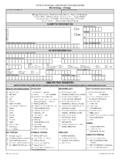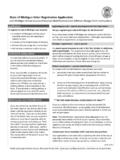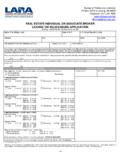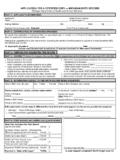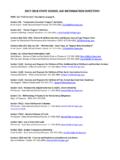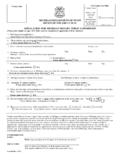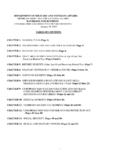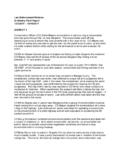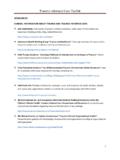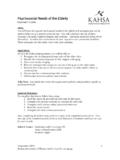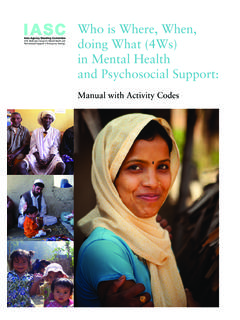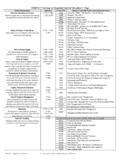Transcription of Michigan Medicaid Nursing Facility Level of Care ...
1 Michigan Department of Community Health Michigan Medicaid Nursing Facility Level of Care Determination Process Guidelines Table Of Contents Informed Beginning the Applicant is Determined Functionally/Medically Providing Program Documenting Settings of Applicant is Determined Not Functionally/Medically Person-Centered Nursing Rehabilitative/Restorative Nursing Rehabilitative/Restorative Care Discharge Potential and Discharge BACKGROUND This document presents the process requirements for admission to three specific long term care programs in Michigan : Medicaid -reimbursed Nursing Facility care, MI Choice Home and Community-Based Services Waiver Program for Elderly and Disabled (MI Choice Program), and the Program of All Inclusive Care for the Elderly (PACE). These guidelines further define the underlying principles for these programs, and speak specifically to the admission process.
2 The Michigan Department of Community Health (MDCH) works to ensure that program participants have control over the quality of their life, and that the services they receive are provided in the most efficient and integrated setting or program. Two core elements assist in achieving these goals: person-centered principles and informed choice. Additionally, participants with more acute and perhaps less chronic needs must be provided Nursing restorative care and discharge planning when appropriate. Guidelines for these requirements are also included. INFORMED CHOICE The concept of informed choice is at the heart of the Michigan Department of Community Health admission process for long term care services. It is essential that program applicants and/or their representatives fully understand all available options under Medicaid .
3 Medicaid -reimbursed Nursing Facility care, the MI Choice Program, and PACE must utilize equivalent functional/medical eligibility criteria as stated by federal law (Social Security Act, Sections 1915c, 1919a, and 1934). When qualifying for any one of these programs, applicants will automatically meet the functional/medical eligibility criteria for all three programs. When programs are open to new enrollment, MDCH wants to ensure that applicants are afforded the opportunity to make an informed choice about where their needs can best be met. Michigan s Informed Choice Process ensures that information, education, and referral systems are available and working to provide the opportunity to make such informed choices. Each of the above program entry points are required to make pertinent information available to each potential participant.
4 Michigan Medicaid Nursing Facility Level of Care Determination 11/01/04 Process Guidelines Page 1 of 5 BEGINNING THE PROCESS DETERMINATION OF FUNCTIONAL/MEDICAL ELIGIBILITY MDCH requires use of an electronic web-based tool to determine functional/medical eligibility for programs required to use the Nursing Facility Level of care criteria. The end result of this electronic system is a document titled Freedom of Choice." The electronic system automatically identifies the applicant and the functional/medical eligibility determination and documents this information on the Freedom of Choice form (which can be found at , "Providers , "Information for Medicaid Providers , " Michigan Medicaid Nursing Facility Level of Care Determination"). Applicants who do not meet the eligibility criteria have the option to request a review from MDCH or its designee.
5 APPLICANT IS DETERMINED FUNCTIONALLY/MEDICALLY ELIGIBLE PROVIDER IS REQUIRED TO REVIEW ALL OPTIONS WITH APPLICANT Upon determination of functional/medical eligibility, the provider must explain all three program options to the applicant, as well as other Medicaid and community-based programs when appropriate. The provider should rely on the Access Guidelines to Medicaid Services for Persons with Long Term Care Needs (termed Access Guidelines from here forward) for eligibility criteria and other information (found at ). Participants who become eligible based on Door 3, 4, or 5 of the Michigan Medicaid Nursing Facility Level of Care Determination must be informed that eligibility for continued services may be short term only. PROVIDING PROGRAM INFORMATION INFORMATION ABOUT SPECIFIC PROGRAMS AVAILABLE IN THE APPLICANT S GEOGRAPHIC LOCATION OR CONTACT INFORMATION FOR COMMUNITY REFERRAL AGENCIES MUST BE PROVIDED When the consumer states an interest in community options, the provider must inform the individual about specific community programs or provide information about agencies that provide such information.
6 The Access Guidelines will provide basic information that is applicable across the state of Michigan . DOCUMENTING ALTERNATIVES SPECIFIC ALTERNATIVE INFORMATION IS PROVIDED Section II of the Freedom of Choice form confirms that the applicant has received written information regarding appropriate local programs. The written information must include the type of program, eligibility requirements, and contact information for the region. SETTINGS OF CARE OPTIONS FOR, AND INFORMATIONAL ACCESS TO, THE MOST INTEGRATED SETTING OF CARE A critical aspect of Michigan s Informed Choice Process (Freedom of Choice form) is to ensure that applicants understand their options and that they have ongoing access to information about all settings and programs. As the functional ability of participants may improve over time, it is important to continue to update their options and discharge plan.
7 Guidelines for discharge planning are included in later sections and in the Access Guidelines. APPLICANT IS DETERMINED NOT FUNCTIONALLY/MEDICALLY ELIGIBLE ADVERSE ACTION NOTICE AND REFERRAL INFORMATION PROVIDED When the applicant fails to qualify under the Michigan Medicaid Nursing Facility Level of Care Criteria, the provider must issue an adverse action notice and refer the applicant to appropriate local agencies for assistance. The provider should rely on the Access Guidelines (found at ) for program eligibility criteria and other information. The applicant's Freedom of Choice form must be kept on file for three years. PERSON-CENTERED PROCESSES MDCH requires a person-centered approach to planning for the three programs noted above. Such an approach empowers participants to define the direction for their life.
8 During the planning process, care plan facilitators must immediately seek to understand the interests and chosen life conditions of the participant. The resulting care plan must be consistent with identified and documented personal goals. During the ongoing planning process, it is essential to discover evolving participant wishes in regard to advanced planning, ethnic and cultural issues, and overall goals for living. Michigan Medicaid Nursing Facility Level of Care Determination 11/01/04 Process Guidelines Page 2 of 5 Person-centered planning requires that it is the individual who defines what is meaningful in life and what really matters most. All participants must have the opportunity to make informed choices and exercise control to the fullest extent possible. Sometimes, they must be supported by others (legal guardians, designated representatives, program staff) in this process.
9 Evidence of Person-Centered Care Planning must be demonstrated through the following: The medical record must include the following: o care plans that clearly document participant strengths and skills and chosen interventions to foster these abilities, as well as participant-stated goals for care. o evidence through progress notes and care planning documents that the participant fully and actively participates in making the decisions that affect quality of life. Planning strategies and resources must be consistent with the desired outcomes and needs of the participant. o documented planned interventions acknowledging a participant s cultural background issues when they affect the planning and decision-making process. o evidence through progress notes and care planning documents that the participant expresses their preferences, if they choose, during the person-centered planning process with the support of family, friends, and staff if necessary.
10 O documentation that the participant chose whether or not other persons should be involved in the person-centered planning process. o documentation that the participant chose their desired care outcomes, and caregivers whenever possible. o evidence that the participant s preferences and outcomes were seriously considered and, in situations where it was difficult to implement their planned interventions, the team arrived at a compromise acceptable to the participant. The care plan must remain current at all times. Interventions must be monitored on an ongoing basis for their effectiveness in achieving the outcomes identified by the participant. These are critical elements since goals and preferences are constantly evolving. It is important to keep asking questions, listening and discovering the preferences of the participant.
